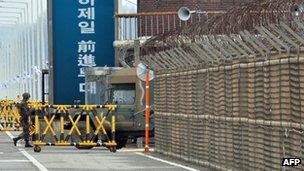North Korea rejects Kaesong talks with Seoul
- Published

North Korea has rejected Seoul's call for talks on resuming operations at a joint industrial zone.
In a statement, Pyongyang warned that South Korea's ultimatum would "lead to no good results".
On Thursday, Seoul gave the North 24 hours to agree to talks on the Kaesong Industrial Complex, warning of "grave measures" if its offer was ignored.
South Korea's president later held a meeting with top officials to discuss next steps, Yonhap reported.
The stoppage was taking a heavy toll on South Korean firms, the agency quoted her as saying.
A statement from the Unification Ministry was expected shortly, a separate report said.
North-South tensions are high following Pyongyang's nuclear test in February and the subsequent imposition of expanded UN sanctions.
'Tough action'
The Kaesong complex, launched in 2003 as a sign of North-South co-operation, is located just inside North Korea. It is the biggest contributor to inter-Korean trade and provides the North with much-needed hard currency.
But Pyongyang blocked South Korean access to the site and pulled out its 53,000 workers earlier this month, amid a series of threats and strong rhetoric from the communist state.
"Pyongyang will be the first to take tough action if the South insists on worsening the situation at the border town," North Korea's National Defense Commission said in a statement.
"The kind of ultimatum made by the South the day before will only lead to no good results".
The remaining 175 South Koreans still in the complex are believed to be running out of food and medicines, because the North has refused to allow fresh supplies from the South into the industrial park.
The South Korean government has refused to spell out what measures it may take, but there is speculation that it may be considering pulling out its remaining citizens, the BBC's Lucy Williamson in Seoul reports.
But that would leave South Korean assets open to seizure by the North Korean authorities, as happened before at a moth-balled tourism site run by the two countries, our correspondent adds.
UN Secretary-General Ban Ki-moon was aware of the South's call for talks, and "sincerely [hoped] the operation of the complex [could] return to normal as soon as possible through dialogue," a UN spokesman said on Thursday.